
Historical fiction is a genre that combines the real events and people of the past with fictional elements to create a compelling and immersive story. Authors who write historical fiction often spend a significant amount of time researching the time period, setting, and characters in order to bring their stories to life. In this article, we will take a behind-the-scenes look at the process of researching and writing historical fiction, and explore why it is an important genre in literature.
Researching Historical Fiction
Research is a crucial part of writing historical fiction. Whether the story is set in ancient Rome, medieval Europe, or the American Civil War, authors must have a deep understanding of the time period in order to accurately portray the setting, events, and people. This often involves studying primary sources such as diaries, letters, and historical documents, as well as secondary sources like history books and academic articles.
Authors also often conduct on-site research, visiting historical landmarks, museums, and other relevant locations to gain a sense of the physical environment and atmosphere of the time period. This attention to detail is essential for creating a believable and immersive historical world for readers to explore.
Writing Historical Fiction
Once the research is complete, authors can begin the process of writing historical fiction. This involves weaving together the factual elements of history with the fictional elements of the story. Authors must strike a delicate balance between staying true to the historical record and creating engaging characters and plotlines.
One of the challenges of writing historical fiction is reconciling the need for accuracy with the demands of storytelling. Authors must often make choices about what to include, omit, or alter in order to create a cohesive and engaging narrative. This can involve making decisions about which historical figures to feature, how to depict historical events, and what language and dialogue to use.
Why Historical Fiction Matters
Historical fiction is an important genre in literature for several reasons. Firstly, it allows readers to engage with and learn about history in an accessible and entertaining way. Through the lens of fiction, readers can gain a deeper understanding of different time periods, cultures, and events, and develop empathy for the people who lived through them.
Historical fiction also has the power to illuminate forgotten or overlooked aspects of history. By centering the stories of marginalized or underrepresented groups, historical fiction can shed light on perspectives and experiences that have been neglected by traditional historical accounts.
Finally, historical fiction can inspire readers to delve further into historical research and study. A well-crafted historical novel can spark curiosity about a particular time period or figure, leading readers to seek out non-fiction books, documentaries, and other resources to learn more.
Conclusion
Researching and writing historical fiction is a complex and rewarding process that requires a deep understanding of history, a creative imagination, and a commitment to engaging storytelling. By bringing the past to life through fiction, authors of historical fiction have the power to educate, inspire, and entertain readers, making this genre an enduring and vital part of literature.
FAQs
1. How do you decide which historical events to include in your fiction?
Deciding which historical events to include in fiction often depends on the overall story being told. Authors may prioritize events that have a direct impact on their characters or that serve as essential context for the time period.
2. How do you ensure the accuracy of historical details in your fiction?
Accurate historical details are typically ensured through thorough research and fact-checking. Authors may consult multiple sources and experts to verify the accuracy of the historical elements in their fiction.
3. What are some common challenges of writing historical fiction?
Common challenges of writing historical fiction include balancing historical accuracy with storytelling, avoiding anachronistic language and behavior, and navigating sensitive or controversial historical topics.
Why We Need Website
Having a website for historical fiction authors and enthusiasts is important for several reasons. Firstly, it provides a platform to showcase and promote historical fiction novels, allowing authors to reach a wider audience and connect with readers who share an interest in the genre.
Additionally, a website can serve as a hub for resources and information about historical fiction, including recommended reading lists, author interviews, and historical research tips. This can be valuable for both aspiring historical fiction writers and readers looking to explore the genre further.
Furthermore, a website can be used to foster a sense of community among historical fiction enthusiasts, providing opportunities for discussion, collaboration, and the sharing of insights and knowledge about historical periods and figures.
For authors, a website can also serve as a professional platform to showcase their expertise in historical research and writing, as well as to engage with fans and potential readers through blog posts, newsletters, and other interactive features.
Keywords
historical fiction, researching, writing, research process, writing process, historical accuracy, storytelling, historical events, historical details, website, community, author platform, literature, research tips

